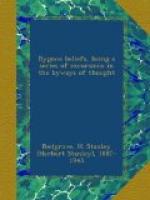[1b] Rev. EDWARD SMEDLEY, M.A.: The Occult Sciences (Encyclopaedia Metropolitana), ed. by ELIHU RICH (1855), p. 144.
The cock has always been reckoned a bird possessed of magic power. At its crowing, we are told, all unquiet spirits who roam the earth depart to their dismal abodes, and the orgies of the Witches’ Sabbath terminate. A cock is the favourite sacrifice offered to evil spirits in Ceylon and elsewhere. Alectromancy[2] was an ancient and peculiarly senseless method of divination (so called) in which a cock was employed. The bird had to be young and quite white. Its feet were cut off and crammed down its throat with a piece of parchment on which were written certain Hebrew words. The cock, after the repetition of a prayer by the operator, was placed in a circle divided into parts corresponding to the letters of the alphabet, in each of which a grain of wheat was placed. A certain psalm was recited, and then the letters were noted from which the cock picked up the grains, a fresh grain being put down for each one picked up. These letters, properly arranged, were said to give the answer to the inquiry for which divination was made. I am not sure what one was supposed to do if, as seems likely, the cock refused to act in the required manner.
[2] Cf. ARTHUR EDWARD WAITE: The Occult Sciences (1891), pp. 124 and 125.
The owl was reckoned a bird of evil omen with the Romans, who derived this opinion from the Etrurians, along with much else of their so-called science of augury. It was particularly dreaded if seen in a city, or, indeed, anywhere by day. PLINY (Caius Plinius Secundus, A.D. 61-before 115) informs us that on one occasion “a horned owl entered the very sanctuary of the Capitol; . . . in consequence of which, Rome was purified on the nones of March in that year."[1]
[1] PLINY: Natural History, bk. x. chap. xvi. (BOSTOCK and RILEY’S trans., vol. ii., 1855, p. 492).
The folk-lore of the British Isles abounds with quaint beliefs and stories concerning birds. There is a charming Welsh legend concerning the robin, which the Rev. T. F. T. DYER quotes from Notes and Queries:—“Far, far away, is a land of woe, darkness, spirits of evil, and fire. Day by day does this little bird bear in his bill a drop of water to quench the flame. So near the burning stream does he fly, that his dear little feathers are SCORCHED; and hence he is named Brou-rhuddyn (Breast-burnt). To serve little children, the robin dares approach the infernal pit. No good child will hurt the devoted benefactor of man. The robin returns from the land of fire, and therefore he feels the cold of winter far more than his brother birds. He shivers in the brumal blast; hungry, he chirps before your door."[2]
[2] T. F. THISELTON DYER, M.A.: English Folk-Lore (1878), pp. 65 and 66.




